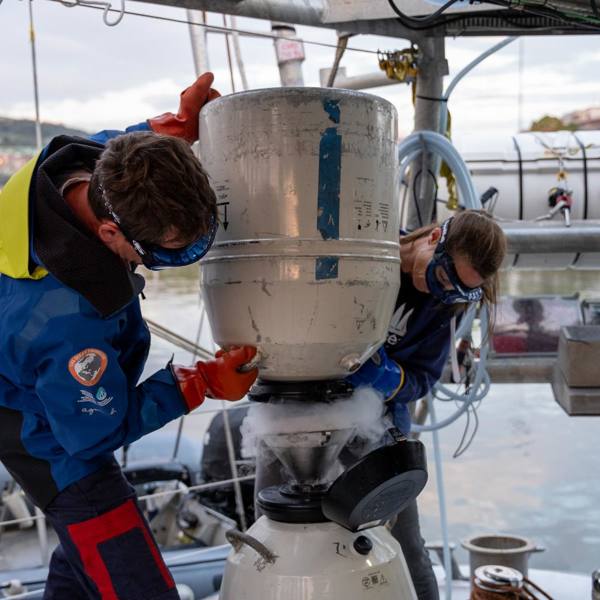Marine biologists aboard the renowned French research schooner are on a mission to collect ocean samples from some of the most ecologically significant areas in the world. The goal: to study marine biodiversity, ecosystem health, and the genetic makeup of planktonic organisms. To maintain the integrity of these biological samples, some of which degrade within hours, the vessel needed a fast, reliable, and autonomous way to preserve them under strict cryogenic temperature conditions.

Image credit: © Maeva Bardy, Tara Ocean Foundation
The Challenge – Preservation at Sea
The ship’s research team explores remote ocean regions, selecting sampling sites based on dynamic events such as phytoplankton blooms: rapid increases in phytoplankton populations, often visible as colourful patches from space. Once a target zone is identified, the vessel deploys specialized sampling tools tailored to the depth, and composition and specific objective of sampling.
When samples are brought aboard, they are filtered in one of the vessel’s three onboard laboratories to isolate specific components. For example, when studying plankton, seawater is filtered to retain only the organisms of interest, which are then stored in 5 ml test tubes. At this stage, time becomes critical: seawater samples must be processed within 15 minutes to a few hours, and planktonic organisms must be flash-frozen in liquid nitrogen at -196°C to preserve their molecular integrity. Genomic material such as DNA and RNA is inherently unstable and prone to rapid degradation without immediate cryogenic preservation.
On-site generation for effective preservation
To meet the demands of this mobile, high-stakes environment, the Noblegen Triton Liquid Nitrogen Generator was brought on board as a compact, plug-and-play solution. The Triton enables rapid freezing of planktonic organisms, preventing degradation of DNA and cellular structure, while eliminating the logistical and safety challenges of transporting pre-filled LN₂ dewars.
The unpredictable nature of ocean research is now managed more safely and efficiently with the Triton, which provides direct access to cryogenic material and full autonomy from shore-based supply chains. As a result, missions can extend for months without interruption, and risks related to spillage, pressure hazards, or manual handling are significantly reduced.
These strict preservation conditions ensure samples arrive intact at onshore labs, where they are sorted, catalogued, and analysed. The resulting data contributes valuable insights into our knowledge of marine life, biodiversity, and genetics.
Header image credit: © Leslie Moquin, Tara Ocean Foundation


